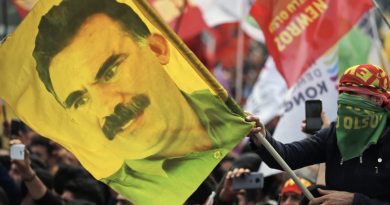Iran: The ambition of the victims of the 1988 massacre a big step closer to reality
by Hassan Mahmoudi
This has been a deep-seated demand of the Iranian people and their resistance as well as the families of the massacred political prisoners.
In the run-up to, and during, World War II, the appeasement policy towards Hitler turned out as a catastrophe for mankind. Such a policy towards the religious dictatorship in control of Iran for 41 years, has borne no fruit other than, for the people of Iran, killing, massacre and the plundering of the country’s assets and, for the region, terrorism and warmongering which has led to countless deaths and unprecedented numbers of refugees, turning the Middle East into a dilemma for the world.
What worked very much as a propellant for the mullahs ruling Iran was that, through the policy of appeasement, its human rights violations were, and still are, ignored. This has emboldened it to such a degree that it has changed the place of the victims and the henchmen.
Due to the appeasement towards Iran’s despotism, more than one hundred and twenty thousand executions have taken place over the past four decades, of standout significance the massacre of 30,000 political prisoners in 1988. We have not forgotten that, during the 1988 massacre, the United Nations did its utmost to cover up this crime. Despite this, the efforts of the Iranian resistance, with the support of democratic forces in Western countries and of the people’s representatives of these countries in their parliaments have led to the ruling clerical regime in Iran is condemned 65 times at the highest levels of the United Nations.
Recently, the tragedy of the massacre of political prisoners in the Summer of 1988 has started to attract attention at the Government level of several countries. More than a year ago the Foreign Ministry of an influential Arab country officially asked the United Nations to add the investigation of this crime to its agenda.
Then, on Tuesday 22 July 2020, just after the 32nd anniversary of the start of this massacre, Ms. Morgan Ortagus, a spokesperson for the United States Department of State took an important stand, officially remarking on the following 3 points:
1 – “July 19th, 1988 marks the anniversary of the start of Iran’s so-called death commissions set up on the orders of Ayatollah Khomeini. These commissions reportedly forcibly disappeared and extra-judicially executed thousands of political dissident prisoners.”
According to the survivors of this massacre, the mass murder of political prisoners and the formation of the ‘death commissions’ took place immediately after the Iranian regime accepted the 598 UN Resolution (the Ceasefire which ended the Iran-Iraq war). This means that Khomeini had pre-planned a decision to end the lives of these prisoners, to begin immediately after agreeing on the truce with Iraq.
Now the US Department of State is righteously pinpointing this fact.
2 – “The current head of the Iranian judiciary and current minister of justice has both been identified as former members of this death commissions.”
It is important to emphasize that many of the highest-ranking mullahs involved in the 1988 massacre, including Clergymen Ebrahim Reisi and Mustafa Pour-Mohammadi, are still brazenly proud of their involvement in this horrific crime.
3 – “The United States calls on the international community to conduct independent investigations and to provide accountability and justice for the victims of these horrendous violations of human rights, organized by the Iranian regime”.
This has been a deep-seated demand of the Iranian people and their resistance as well as the families of the massacred political prisoners. The world must stop its appeasement policy towards the perpetrators of this massacre, which gifted them impunity so that the murderers of more than 30,000 political prisoners can be prosecuted. Now the US State Department has joined this call. This is a milestone, marking the first step in recognizing the rights of the people of Iran and the families of these victims so that the perpetrators could be put on trial.
This achievement, after 32 years, and on the anniversary of this massacre, is founded on perseverance, an unyielding quest towards Iran’s freedom and democracy. The people of Iran will neither forget nor forgive such a crime nor will they forget the action of the US State Department in taking this important first step towards justice.
Featured Image credits: USFLHR.
Hassan Mahmoudi is a Europe-based social analyst, researcher, independent observer, and commentator of Middle Eastern and Iranian Politics. He tweets under @hassan_mahmou1.



